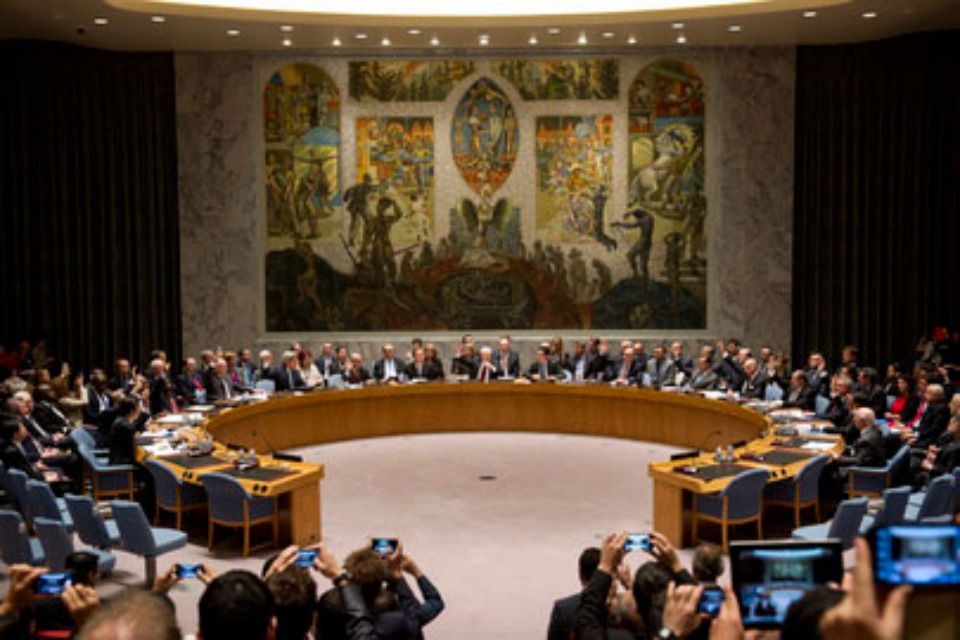‘Terrorism continues to pose a grave threat to international peace and security’
Statement by UK Ambassador Wilson to the briefing by the 1267/1540/1373 Committees to the UN Security Council

I thank the Chairs of the Committees: Ambassadors Quinlan, Loulichki and Oh, for their comprehensive briefings today and for their leadership of these three important Committees.
Mr President,
Terrorism continues to pose a grave threat to international peace and security. Since these Committees last briefed the Security Council, we have seen many attacks by terrorist groups, including the tragic attack against the Westgate shopping mall in Nairobi, Kenya, that killed 67 civilians. The work of these committees is vital.
As highlighted in Ambassador Quinlan’s briefing, the threat from terrorism is evolving. Terrorist propaganda is becoming more sophisticated. It has now contributed to the self-radicalisation of individuals and small groups. We know this in the United Kingdom and we have seen the effects of self-radicalisation most recently in London with the killing of an off-duty soldier in London by individuals in May of this year, an act that produced revulsion at home.
Terrorism is an international threat. It transcends geographic borders. And it requires an international response. But it can be disrupted with the right tools and with a unified effort and I think we have seen evidence of that in front of us here today. The Council must make the best possible use of the tools available to us in order to counter this threat.
Mr President,
Al-Qaida sanctions are vital to disrupt the activities of terrorist actors. We support the Committee’s efforts to improve implementation of AQ sanctions as outlined by the Chair and urge Member States to implement the regimes that we’ve agreed.
As terrorism evolves, this requires sanctions also to evolve to counter the threat. The United Kingdom commends the agreement of the 1267 Committee to engage Member States of the Sahel and Maghreb regions next month. The global reach of UN sanctions can be a powerful tool to strengthen states’ own domestic counter terrorism efforts.
Ambassador Quinlan, we think you’re right to highlight the importance of fair and clear procedures within the AQ sanctions regime. And as others have said, the Ombudsperson process is important for the relevance and robustness of the regime and it deserves support from Member States. I think there has been a clear signal here today on the importance of this role from Members of the Security Council.
Mr President,
Next year we mark the ten year anniversary of the adoption of Resolution 1540. There is much to celebrate. All but 22 states have reported on their obligations to stem the proliferation of nuclear, chemical and biological weapons to non-state actors.
But global fears that terrorists may acquire Weapons of Mass Destruction still persist. This remains a strategic priority. To comply with their obligations under this Resolution and for it to be effectively implemented and monitored, all States must comply with both the letter and the spirit of the Resolution. Evasive answers, such as those given by Syria on chemical weapons before September this year, can cast doubt on a state’s commitment to effectively account for and protect nuclear, biological and chemical weapons. We’ve witnessed the the destruction and suffering inflicted by these weapons. Prohibiting their use is the responsibility of all. Measurable and sustained progress on this is the only way to establish enduring global confidence.
The last time we met to discuss counter terrorism, the United Kingdom stressed the need for all the relevant components of the United Nations counter terrorism system to work together and avoid duplication and others have referred to this today.
We welcome the appointment of Jean-Paul Laborde as the head of Counter Terrorism Executive Directorate earlier this year and of Jehangir Khan as head of the Counter Terrorism Implementation Task Force.
As others have said, this new leadership must bring with it a new level of co-ordination, with clear allocation of activity and responsibility for assistance, reporting and capacity building. CTED should focus on conducting assessments and facilitating assistance. CTITF should focus on its role in convening UN entities to deliver capacity building. There should also be a more comprehensive, forward-looking information sharing matrix of UN CT activity. This would assist Member states in planning their co-ordination with, and support for, UN activity.
We support Ambassador Loulichki’s statement that effective counter terrorism measures and respect for human rights are intertwined. We welcome the integration of Human Rights considerations into CTED’s work and the briefing from the High Commissioner for Human Rights to the 1373 Committee in October.
Mr President,
Our work on counter terrorism cannot become static, nor can it be carried out in isolation. Only through a unified, complementary and evolving approach can the international community effectively deal with the scourge of terrorism. The UK urges the Committees to redouble their efforts to make their work relevant, effective and to adapt to meet the challenges of an evolving terrorism threat.